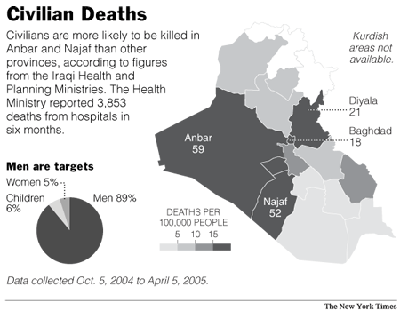I know the reporting's bad because I know people in Iraq. A Marine colonel buddy just finished a stint overseeing the power grid. When's the last time you read a story about the progress being made on the power grid? Or the new desalination plant that just came on-line, or the school that just opened, or the Iraqi policeman who died doing something heroic? No, to judge by the dispatches, all the Iraqis do is stand outside markets and government buildings waiting to be blown up.Naturally, the daily reports of Iraqis getting blown up—an average of 800 civilians and police officers killed each month—might color one's view of Yost's statements. And maybe journalists on the schoolpainting beat get pulled off assignment when dozens are killed by insurgents.
But I'll leave it to this conservative columnist's peers to straighten him out. Editor & Publisher's Greg Mitchell contacted journalists at the Baghdad bureau of Knight-Ridder, the same company that owns the PiPress. Among those who replied was bureau chief Hannah Allam:
I invite Mr. Yost to spend a week in our Baghdad bureau, where he can see our Iraqi staff members' toothbrushes lined up in the bathroom because they have no running water at home. I frequently find them camping out in the office overnight because electricity is still only sporadic in their sweltering neighborhoods, despite what I'm sure are the best-intentioned efforts of people like his Marine buddy working on the electrical grid.For an interesting thread at Romenesko by Yost's peers—including fellow Pioneer Press staffer Charles Laszewski, who writes, "[Yost has] spat on the copy of the brave men and women who are doing their best in terrible conditions. More than 20 reporters have died in Iraq from around the world. You have insulted them and demeaned them, and to a much lesser degree, demeaned the reporters everywhere who have been threatened with bodily harm ...I am embarrassed to call you my colleague."—click here.
Mr. Yost could have come with me today as I visited one of my own military buddies, who like most officers doesn't leave the protected Green Zone compound except by helicopter or massive convoy. The Army official picked me up in his air-conditioned Explorer, took me to Burger King for lunch and showed me photos of the family he misses so terribly. The official is a great guy, and like so many other soldiers, it's not politics that blind him from seeing the real Iraq. The compound's maze of tall blast wall and miles of concertina wire obscure the view, too.
Mr. Yost can listen to our bureau's morning planning meetings, where we orchestrate a trip to buy bottled water (the tap water is contaminated, when it works) as if we're plotting a military operation. I wonder whether he prefers riding in the first car -- the most exposed to shrapnel and bullets -- or the chase car, which is designed to act as a buffer between us and potential kidnappers.
Perhaps Mr. Yost would be moved by our office's tribute wall to Yasser Salihee, our brave and wonderful colleague, who at age 30 joined the ranks of Iraqi civilians shot to death by American soldiers. Mr. Yost would have appreciated one of Yasser's last stories -- a rare good-news piece about humanitarian aid reaching the holy city of Najaf.
Mr. Yost's contention that 14 of Iraq's 18 provinces are stable is pure fantasy. On his visit to Baghdhad, he can check that by chatting with our resident British security consultant, who every day receives a province-by-province breakdown of the roadside bombs, ambushes, assassinations and other violence throughout the country.
If Baghdad is too far for Mr. Yost to travel (and I don't blame him, given the treacherous airport road to reach our fortress-like hotel), why not just head to Oklahoma? There, he can meet my former Iraqi translator, Ban Adil, and her young son. They're rebuilding their lives under political asylum after insurgents in Baghdad followed Ban's family home one night and gunned down her 4-year-old daughter, her husband and her elderly mother in law.
Freshly painted schools and a new desalination plant might add up to "mission accomplished" for some people. Too bad Ban's daughter never got to enjoy those fruits of her liberation.

No comments:
Post a Comment